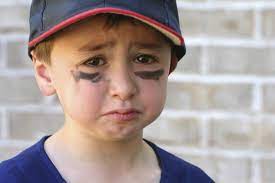
As parents, we want what is best for our children. Many parents enroll their children in sports hoping it will add to their child’s happiness. Playing organized sports teaches them valuable lessons. One main lesson from playing competitive sports is how to cope with losing. Even if you were once a young athlete, you might need to learn how to talk to your kids about losing in sports.
Some losses are heartbreaking. As their parent, you see the work they do behind the scenes. You know their hopes are high, and they are giving it their all. My most challenging moments as a parent have been watching my child struggle in a game. Whenever my son shoots a basket, or my daughter slides into base, I hold my breath. Our hearts can be in our throats even when they are playing well.
Losing is a part of life, but it can be especially tough for kids.
Whether playing tee ball or on the college recruitment circuit, they feel the pressure of performance. They may feel disappointed, frustrated, or even angry. You may see them being hard on themselves, expecting perfection. As a parent, it’s essential to talk to your kids about losing in a way that helps them cope with their emotions and learn from their experiences.
Even the best athletes must work on their mindset.
Athletic ability and practice are not all that is needed to be a successful elite athlete. An athlete’s mental approach to the game can be a huge advantage or a significant weakness. Discuss with your child how their thoughts impact decisions and actions during a game. The right mental approach will help them recover from a disappointing performance sooner.
Here are some tips for how to talk to your kids about losing in sports:
- Acknowledge their feelings. Let your child know that it’s okay to feel disappointed or frustrated when they lose. Don’t try to tell them that they shouldn’t feel that way.
- Focus on the positive. Help your child focus on what they did well, even if they lost the game. Talk about their effort, their teamwork, or their sportsmanship.
- Help them learn from their mistakes. If your child made mistakes during the game, help them identify what they could have done differently. This discussion will help them improve their skills and become a better player.
- Remind them that losing is not the end of the world. Let your child know there will always be other games, and they will not always win. Losing is just a part of playing sports.
- Please encourage them to keep trying. Let your child know you are proud of them for trying their best, even if they didn’t win. Encourage them to keep playing sports and to keep working hard.
Check-in with your emotions about how your child is playing.
We coordinate and curate almost everything our kids do. You drove your child back and forth to practices and extra training sessions. You paid for the equipment, clothing, and travel team fees. You’ve arranged hotel and car rental reservations and taken time away from work to be there for your kid. You may not realize that expressing your frustrations with the coach or travel arrangements and the stress it puts on your life could impact your child.
Remember why you signed your child up to play this sport or with this particular team. What do you ultimately want your child to gain out of this experience? Keep that in the forefront of your mind.
The experience of coping with a loss in sports can enable your child to handle more significant disappointments as they grow. When confronted with a less-than-desirable outcome, they will remember that there is always another game, another practice, and another opportunity to grow and progress. We want them to learn these valuable lessons in sports and carry them into their adult lives.
Sports should be a positive and supportive place where children learn to balance competition and setbacks. These wins and losses are a metaphor for life’s challenges, and how we talk to our kids about losing in sports will translate into how they cope with disappointments as young adults.
If you feel your child’s sport is straining their mental health, consider reading our tips on “How to find the best child therapist.” or downloading our resource guide on “How to Overcome a Personal Crisis.”
Here are some things NOT to do when talking to kids about losing in sports:
- Don’t compare them to others. It’s important to remember that every child is different and learns at their own pace. Comparing your child to other kids will only make them feel worse about themselves.
- Don’t put too much pressure on them to win. Winning is one of many important things. However, the primary focus should be that they have fun and enjoy playing the game.
- Don’t be a poor role model. Kids learn by watching the adults in their lives. If you want your child to have a positive attitude about losing, it’s important to model that behavior yourself.
- Don’t talk badly about other players or coaches. Telling your child they lost because the game was “unfair” is scapegoating the situation. Life isn’t always fair, and this is a lesson most kindly learned by playing sports before they experience it in the “real world.”
Losing can be a negative experience for kids, but it’s integral to learning and growing. A loss can be our most influential teacher. Children who face challenges and persevere develop confidence in overcoming obstacles. You can help your kids cope with their emotions and learn from their experiences by talking to them about losing in a positive and supportive way.
Following these tips can help your child learn how to deal with losing positively and productively. Learn more on how to talk to your kids about losing in sports from this article from the Cleveland Clinic.
Please comment below to let us know how you support your child in a difficult loss.
Subscribe to the Life Happens, Coffee Helps Newsletter to get more posts like this delivered directly to your inbox!
Recommended Reading:
click the image to purchase


